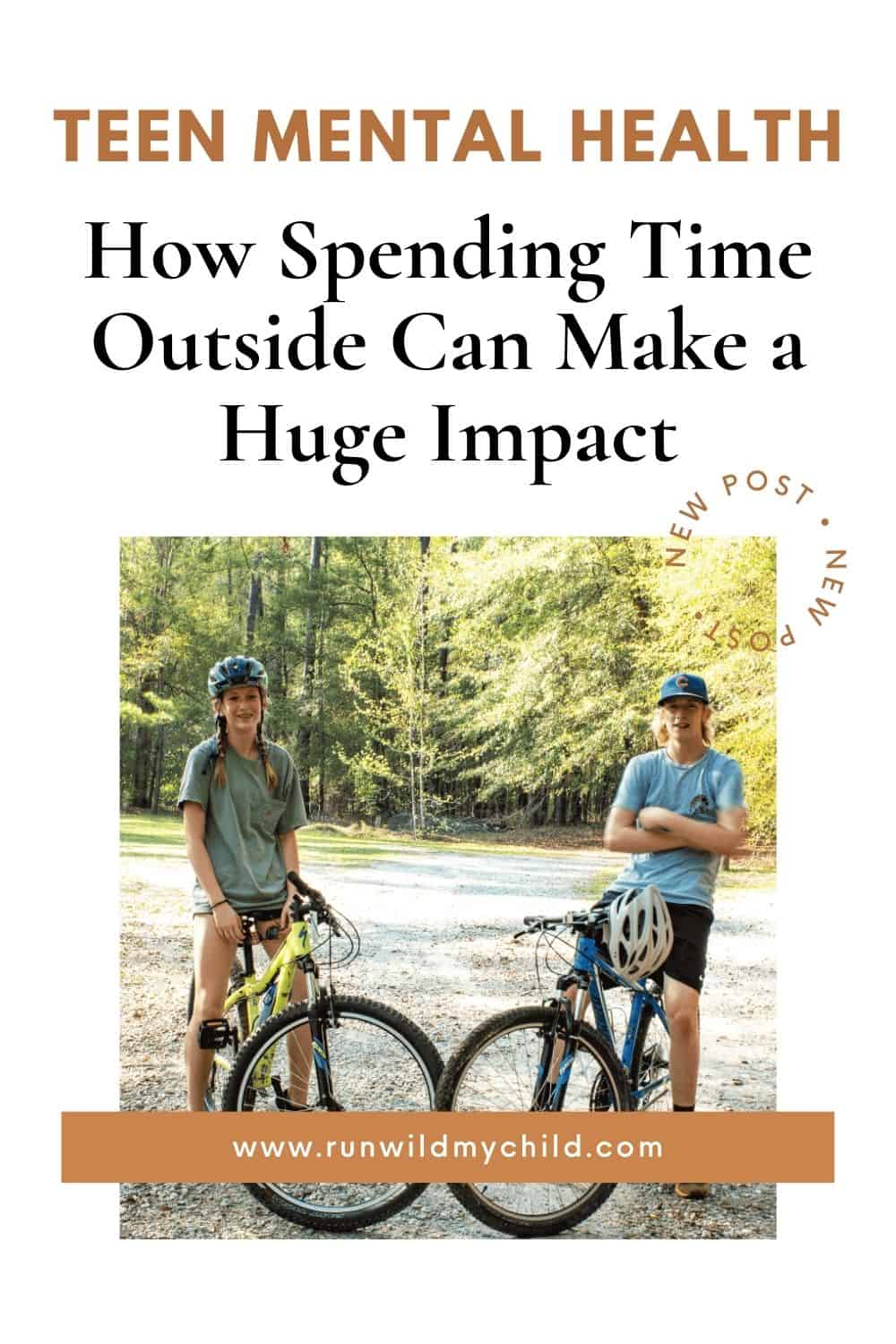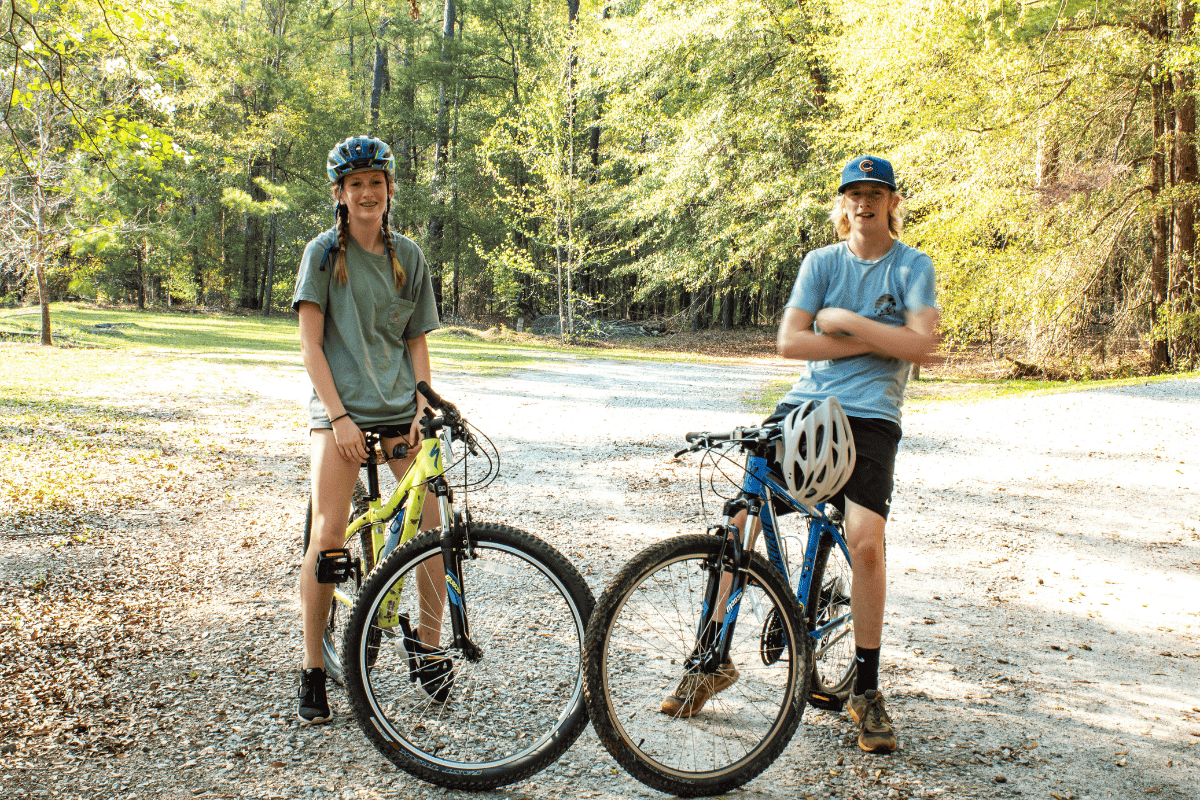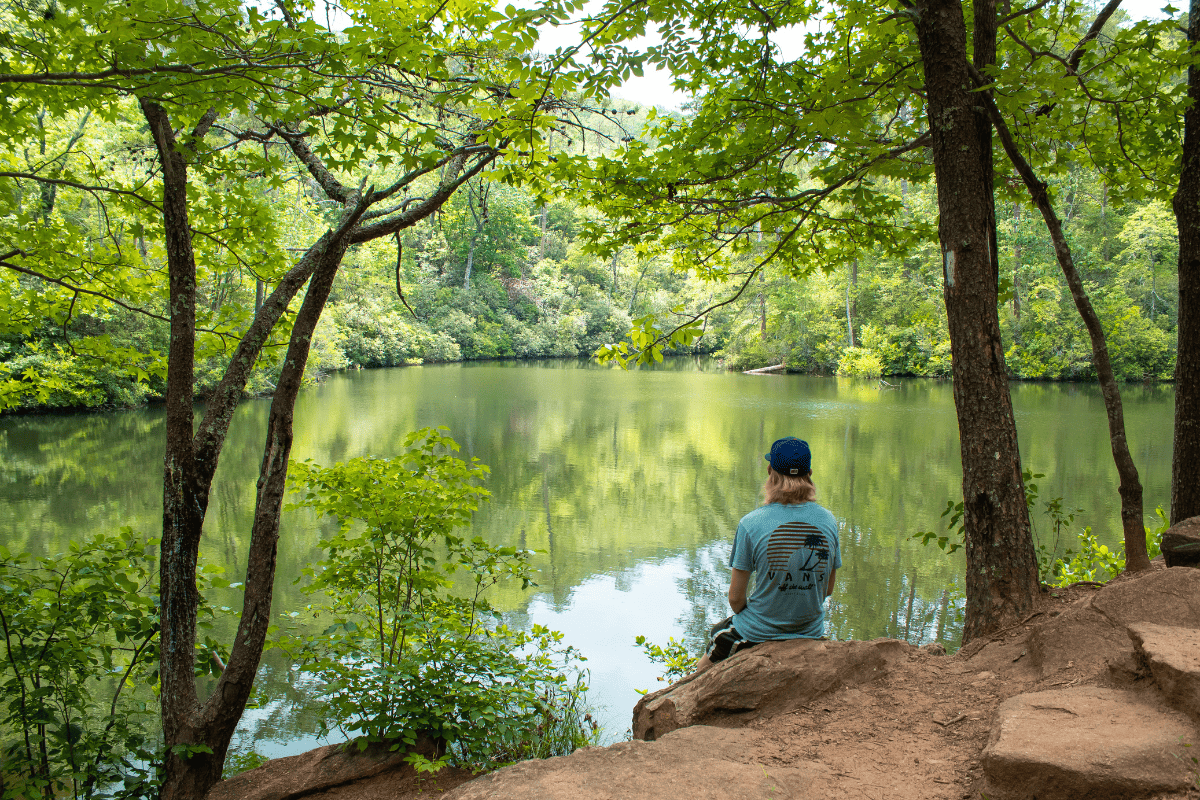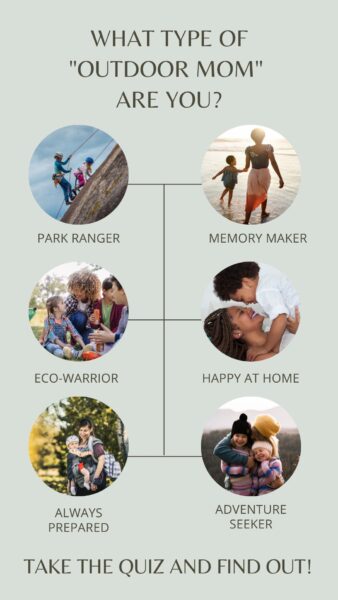In today’s fast-paced, socially distant, yet hyperconnected world, the mental well-being of teenagers is facing an alarming crisis. The prevalence of anxiety, stress, and other mental health challenges among adolescents has reached unprecedented levels, casting a dark shadow over their formative years. As parents, it can be scary to consider the statistics, but it’s also imperative that we delve into the depths of this issue and explore potential remedies that can bring hope and relief. One of those being the great outdoors. Today, Jen Barnes, South Carolina mother to three teens, will shed light on the daunting state of teen mental health, and unveil the transformative power of spending time outside in nature as a vital antidote to anxiety and stress, igniting a path towards healing, resilience, and personal growth.

Using nature as a tool
I have three teens of my own, and I am around adolescents day in and day out. And like you, I even have experience as a teenager myself. While I am not a doctor, nor do I have any training in the mental health field, I have observations, experiences, and anecdotes that tell me this fact…teens need nature.
Teen mental health and nature have a connection. Spending time in nature can have a significant impact on teen mental health. Nature is not the only solution, but it is a powerful tool in our parenting toolbox that we can use to help our children.
We all have a deep-rooted need within us to let go and be free. Free of social constraints, free from school/household responsibilities, and free to be ourselves. Nature and outside time can give that to our teens. This post will show the reality of teen mental health today, ways nature can be an aid, and how-to solutions to help your teens through it all.
Teen mental health today
While I do not want to scare or intimidate you with statistics on the dire state of teen mental health, they are necessary to understand some of why teens are experiencing debilitating diagnoses and daily mental health struggles. Strong mental health is vital to the development of everyone, but it is especially poignant during the adolescent years as teens mature both physically and emotionally.
- Over 2.7 million youth report severe major depression.
- 22% of high school students in a recent survey said they have seriously considered suicide in the past year.
- 25% of teens have a mental health diagnosis from a professional (and this does not include teens who are either too scared to seek help or do not have access to help).

Factors affecting teen mental health
Every organization involved in teen mental health reports that these statistics are on the rise dramatically. And while there is no one single thing we can blame these statistics on, there are several that come to mind and have been cited time and again. Understanding these significant factors that impact teen mental health is crucial in developing effective strategies and interventions to support and nurture their well-being.
Screens
First, we live in an era dominated by screens. The ubiquitous presence of social media platforms has transformed the way teens interact and perceive themselves. The constant exposure to curated online personas, cyberbullying, and social comparison can lead to feelings of inadequacy, isolation, and low self-esteem.
Performance pressure
The pressure to excel academically (or athletically, or extra-circularly), secure scholarships, win games, and gain admission to prestigious institutions has intensified for teenagers. Teens often experience immense stress, anxiety, and burnout due to the high expectations placed upon them.
Traumatic experiences
Teens may experience traumatic events such as physical or emotional abuse, neglect, bullying, or loss. These experiences can have long-lasting effects on their mental health, leading to conditions such as post-traumatic stress disorder (PTSD) or depression. In addition, in the U.S. significantly, we have teenagers that go to school every day, fearing that another school shooting has taken place or will take place.
All of these factors have a tendency to draw anyone inward, but especially teenagers who are still immature in their coping mechanisms and emotional development. It’s on us as parents to help them through this.
Teen mental health and screens
It is almost impossible to have a conversation on teen mental health without talking about screens and the content our teens are consuming on those screens.
Access to adult content
The entertainment and media options available to teens are endless. No, it’s not all evil…but it’s not all good, either. The sheer amount of access to adult content available at their fingertips is unfathomable to most parents. In today’s digital age, explicit material is just a few clicks away, blurring the lines between what is appropriate for adult consumption and what is suitable for impressionable minds.
Exposure to adult content at an early age can have detrimental effects on teens’ cognitive development, self-image, and understanding of healthy relationships. Such content often portrays unrealistic and harmful representations of sexuality, leading to distorted perceptions, confusion, and a distorted sense of self. It can fuel feelings of inadequacy, body shaming, and pressure to conform to unrealistic standards.
Social media
Let me give you my hot take on social media. Not only does social media demand the attention of our teens, but it demands their loyalty. Every time a teen scrolls he/she is told, “You, too, should be a beautiful person with a beautiful life…and here’s how you do it right.” In a world that preaches individualism, there sure is a lot of conformity that is expected. So, in an effort to conform, they go back to the social media that informs them on how to do it. Constant exposure to social media platforms can fuel a cycle of comparison, where teens measure their worth based on carefully curated highlight reels of their peers. This constant comparison can lead to feelings of inadequacy, low self-esteem, and a distorted self-image.
The addictive nature of social media further exacerbates the problem, with excessive screen time replacing real-life social interactions and adversely affecting sleep patterns. The pressure to gain likes, followers, and virtual validation can create a constant sense of anxiety and a fear of missing out (FOMO). Additionally, cyberbullying, (hurtful comments, rumors, and public shaming) can inflict deep emotional scars.

Social media can make teens less social
Paradoxically, as these kids are deeply connected to their screens, they are more socially disconnected than ever. The rise of social media platforms has led to a concerning trend of teenagers becoming less socially engaged in the offline world. While these platforms promise to connect individuals, they often contribute to a decrease in face-to-face interactions and genuine human connections.
Social media can create a false sense of socialization, where likes, comments, and emojis substitute for meaningful conversations and authentic interactions. But, adolescents need peer face-to-face interaction. They need to argue and affirm in real life, not with keyboard courage or placating phrases. They need to be able to observe and read body language and facial cues so that they can understand emotions and reactions. These interactions provide a unique and irreplaceable opportunity for young individuals to learn, grow, and navigate the complexities of the world around them. They also help teenagers to develop essential social skills such as empathy, communication, and conflict resolution.
Social media shows teens what they’re missing
Furthermore, social media has the ability to make teens feel very left out and lonely when they see their friends and schoolmates posting about their activities. Remember how you and I were often blissfully unaware if other friends got together to go to a movie and you weren’t invited? That does not exist anymore. If a few kids hang out, everyone else will know about it when they Snapchat photos. You can even find them all in the same location on snap maps. Naturally, those not invited feel left out and rejected. With girls, this scenario may play out for weeks as gossip, jealousy, and competition can ensue. Of course, these have always been a part of social life, but with screens, it is all instantaneous, and everyone knows.

Teen expectations and exhaustion
Teens also have mental fatigue. We are asking for more and more output academically, physically, and mentally than ever before. Parents often place significant pressure on teenagers to excel academically and perform well in sports, inadvertently leading to negative consequences for their mental and emotional well-being. We are telling them they need to perform harder, faster, stronger, and more adeptly than most of them are ready for. This pressure to perform can create a constant state of stress, anxiety, and fear of failure in our teenagers. They may feel overwhelmed, burnt out, and experience a loss of motivation and joy in learning or playing sports/games they used to love.
Oftentimes, we simultaneously let them off the hook in their character development and pursuit of personal growth at the expense of performance pressure. The relentless pursuit of academic success can lead to a narrow focus on grades rather than fostering a love for learning and personal growth. The demand for excellence in one sport may keep kids from trying new sports or discovering new passions, interests, and hobbies. The constant drive for athletic achievement can also result in physical exhaustion, injuries, and mental burnout.
A generational shift in stress
A recent study showed that 64% of teens report feeling the world is more stressful than when their parents were their age. This increased perception of stress has profound implications for their overall well-being and development. It suggests that teenagers are grappling with unique challenges and pressures that previous generations did not face to the same extent.
The modern world is characterized by rapid technological advancements, increasing academic competitiveness, social media influence, economic uncertainties, and global issues like climate change. These factors, among others, contribute to a heightened sense of pressure, uncertainty, and overwhelm for teenagers.
As parents, we hope that we’re giving our kids the best and making things easier for them than we had, but that doesn’t seem to be the case, according to many teens. There has been a generational shift, and we need to pay attention.
How nature plays a positive role in teen mental health
In a world where teenagers grapple with mounting pressures and the constant bombardment of technology, finding solace and respite in nature has become more crucial than ever. Nature has an inherent ability to heal and restore, offering a sanctuary away from the stresses and anxieties of daily life. Here are some positive benefits of spending time outside that teenagers desperately need.
Sense of calmness
One of the great benefits of nature for teens is the sense of calm it offers. In a world that is adamant to gain teens’ attention with extreme noise and flashes of glitter, nature lets their minds rest. And as their minds rest, their nervous system can relax. Anxiety is reduced as their brains take a break from the worries and cares and instead go blank.
This calmness can be experienced in a simple walk around the neighborhood or a picnic at the park. As I have personally encouraged my own teens to take a break outside, they are now implementing it themselves. I have even heard them say they crave time in nature. When they experience the sense of calmness that nature can provide, they want “the calm”!
Confidence and self-esteem
Another benefit for teens is how nature can play a part in building confidence and boosting self-esteem. My friend Tiphini says that “the biggest perk we’ve seen from pushing our teens to spend time out in nature is an unexpected boost in self-confidence. Whether they are on a multi-day paddle across Lake Superior, navigating moguls on a black diamond run, working to conquer a new mountain bike trail, or pushing themselves up the side of a mountain — they know they can do hard things. They recognize they are capable, and in the tumultuous teen years, this is something pretty special.”
Nature provides a nurturing environment that encourages exploration, self-discovery, and personal growth. When teenagers spend time outside in nature, they are exposed to new challenges. And when they overcome their obstacles, they develop a sense of accomplishment and a belief in their abilities. Moreover, being in nature promotes a break from social comparisons and judgments, providing teenagers with an opportunity to embrace their individuality and build confidence in who they are.
Gratitude
Recently, I have been learning more about blue mind science. This is the scientific proof that spending time on, in, or near water has a positive effect on our bodies, including our mental health. Cited as one of the byproducts of blue time is awe and gratitude. There is a shift from self-focus to recognizing a larger world beyond themselves. The depths of the sea and the sea life within open up their minds to things how many things are possible, and all the things undiscovered. It’s inspiring rather than stifling.

Stress relief
As noted above, there are physiological responses that aid in mental health as well. Studies show that nature is an antidote to stress. Some of the physical responses determined by scientific data are lower blood pressure and stress hormone levels, an enhanced immune system function, a reduction in anxiety, and an improved mood. Anyone would benefit from these things, but with the added pressures teens face, these could be game changers for their daily lives.
Focus
When a teenager’s mind is relaxed, they are able to focus better, as well. When my teenagers are studying, I encourage them to take a break by going for a walk or a bike ride outside to clear their heads, get some fresh air, and physical activity. All these things have been linked to increased focus, a boost in creativity, and battery memory retention.
Time in nature can also foster exceptional creativity by allowing stimuli to push a teen into hyper-awareness. Moving away from “noise” allows their minds to go blank and hone in on some pretty fantastic creativity and purpose. As distractions are eliminated, a teen can see their direction more clearly and discern what gives him/her joy.
Connection
As a mom, one of the greatest benefits of nature in a teen’s life is the way it plays a part in our connection to each other as a family. Without the pull of screens, time in nature gives me the opportunity to really talk to my teens. Without fail, times in nature are the times when my teens open up and talk about the things that matter to them. Nature gives them a place to express themselves and let them be true to themselves.

How to use nature as a nurturer in the life of your teens
Telling your teens they need nature and “go outside” won’t really work. Telling teens anything has little effect. Instead, one method that works for our family is to model what it looks like to use nature to aid in mental health. Show your teens that taking a walk along the river or even a day in the woods to yourself is a great way to alleviate stress. Let your kids see you revert to nature when you need a break, and use outdoor time as a way to self-soothe and regulate your stress and emotions.
In addition, here are some ways you can incorporate more time outside with your teens.
Keep it simple
If outside time is new to your teens, you may want to start with simple solutions. Serve family dinner outdoors one night. Start taking the dog for a walk in the neighborhood together every day. Pack a picnic for lunch at a local park. Set up a hammock in the backyard and make it a reading/resting spot. Your teen does not need to be “outdoorsy” or climb mountains to spend time in nature. Fresh air and sunshine in your own backyard can do so much to relax and reset.
Try new things outside
If your teens don’t particularly have a passion or interest, this can be a great excuse to explore some new outside activities. I have found that exposure often drives teens toward nature as they find new things they try and enjoy. Fishing, surfing, sailing, trail running, and mountain biking are all ideas to let your teens give a try. When they have an activity that brings them joy, they are more likely to seek out that time in nature on their own.
Let your teen lead the way
I know this can be scary, but teens are moving toward adulthood, and independence — they crave it. Give your teen the opportunity to choose and plan something that excites them. Rock climbing may not be your idea of fun, but if it is something your teen wants to explore and it gets them outside, why would you stand in the way? If snowboarding is an outlet for your teen to burn off stress, don’t you want to encourage that? The bottom line here is to let them have an idea and then let them find a plan to make it happen.
Encourage your teens to invite friends
There is no denying that teens function in peer groups, and the pack mentality is strong during the adolescent years. In a post-covid world, though, there is less emphasis on face-to-face interactions. Use outdoor time as a way to help your teens reconnect with their peers. Activities in nature are an easy way to gather groups together for fun. River tubing, bonfires, frisbee golf, beach games, cliff/waterfall jumping, and campouts bring teens together and give them the freedom to have fun and connect together in nature.

The connection between teen mental health and nature
I hope I have made the case for the connection that exists between teen mental health and nature. My own teens tell me (and their friends) they need time outside. I recently overheard my teenage daughter on the phone with a friend talking about feeling like she was drowning in schoolwork and responsibilities. She admitted that she just wanted to get outside and take a hike…preferably in Washington state, where there was no cell service. (Note: a few summers ago, we hiked in Olympic National Park, and I guess she realized how wonderful it really was to disconnect and be free from the daily grind. That trip paid off!)
It made me so happy to hear her realize that getting outside and into nature was her first response to stress and her go-to coping mechanism. That has been my goal, to give my teens an awareness of their mental health state and to provide them with a solution to help them cope. Getting outside helps them get back to a renewed place, ready to face the next challenge in life.

How do you help your teen get outside?
Do you feel it helps?

About the author
Jen has been married to her original adventure partner, John, for 20 years. She is a mama to 3 teenagers who, although they have busy and independent lives, love to adventure in the outdoors when they can. Jen is a native of Chicago, but has lived in South Carolina for two decades and calls it home. She’s always planning the next adventure for herself or her friends, whether near or far. Hiking, kayaking, sailing with her family, or traveling the world is all about the experience and the journey. Her extroverted nature keeps her talking and smiling with anyone she meets along the way. She’s on a mission to show other busy families that traveling with teenagers is possible and fun!
You can find Jen online in the following locations:
Instagram: @gofamilyadventure
Website: Go Family Adventure
RWMC Posts: Jen Barnes










Thank you for explaining that expectations for teens have increased and could be the cause of some of their mental health problems. We’ve been worried for our son lately, since he’s expressed problems with burnout from school. I’ll be sure to try some of what you’ve suggested to see if it will help before seeing if he may need to talk to someone.